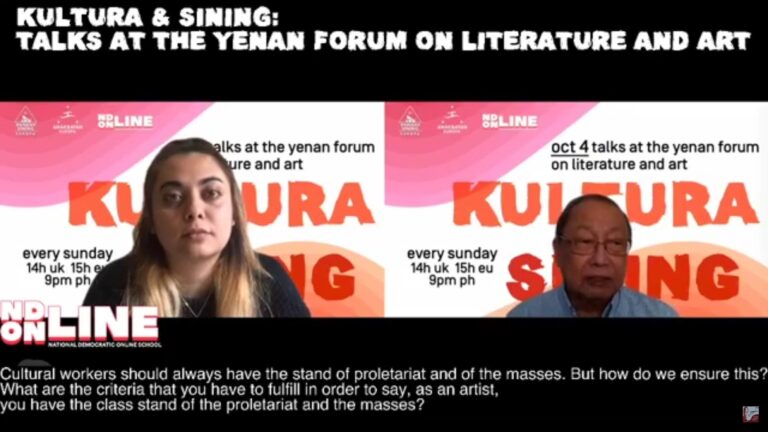
Questions by Edna Becher of Panday Sining Europa and answers by Jose Maria Sison, Chairperson Emeritus of the International League of Peoples’ Struggle.
- Talks at the Yenan Forum is a speech of Mao Zedong on the relationship between work in the literary and artistic fields and revolutionary work in general. Since the May 4th Movement, a cultural army has taken shape in China. To have a better background, can you talk about the May 4th movement? What can the Philippines learn from it?
JMS: The May 4th Movement was an anti-imperialist cultural and political movement which emerged from the student mass protests that began with 4000 students from several universities in Beijing on May 4, 1919. The student masses rose up against the traitorous policy of the Chinese reactionary government that complied with the Versailles Treaty of the imperialist powers and allowed Japan to rule territories in Shandong that Germany had surrendered.
The militant student protest movement spread nationwide from Beijing and gained the support of the broad masses of the people. It inspired the New Cultural Movement, which laid stress on anti-imperialism and the adoption science and democracy as new rallying points against the Confucian tradition. It stimulated among the young Chinese intellectual, cultural and political leaders the study of revolutionary movements abroad, especially the Great October Socialist Revolution, and led to the founding of the Communist Party of China in 1921.
Mao Zedong was influenced by the May 4th Movement and praised it in 1939 in the following words: “The May 4th Movement twenty years ago marked a new stage in China’s bourgeois-democratic revolution against imperialism and feudalism. The cultural reform movement which grew out of the May 4th Movement was only one of the manifestations of this revolution. With the growth and development of new social forces in that period, a powerful camp made its appearance in the bourgeois-democratic revolution, a camp consisting of the working class, the student masses and the new national bourgeoisie. Around the time of the May 4th Movement, hundreds of thousands of students courageously took their place in the van. In these respects the May Fourth Movement went a step beyond the Revolution of 1911.”
In his “Talks at Yenan Forum” on May 2, 1942, Mao further said: “In our struggle for the liberation of the Chinese people there are various fronts, among which there are the fronts of the pen and of the gun, the cultural and the military fronts. To defeat the enemy we must rely primarily on the army with guns. But this army alone is not enough; we must also have a cultural army, which is absolutely indispensable for uniting our own ranks and defeating the enemy. Since the May 4th Movement such a cultural army has taken shape in China, and it has helped the Chinese revolution, gradually reduced the domain of China’s feudal culture and of the comprador culture which serves imperialist aggression, and weakened their influence.